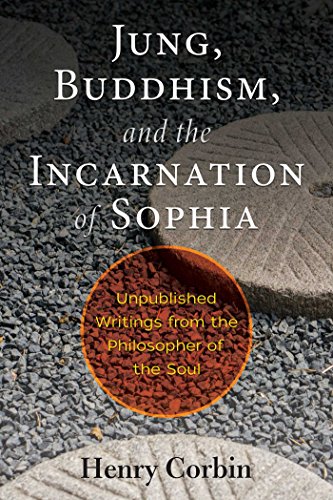

By
Henry Corbin
Reviewed by Henry Reed
What do Jung and Buddhism have in common with the Incarnation of Sophia, and why should we care, and who's Henry Corbin and why didn't they publish his ideas until now, might you ask? Good questions, all, and I've found on my walks of the past month or so a wonderment building about what I might share with you about this little book that could make a difference.
Marilyn Ferguson, author of The Aquarian Conspiracy, suggested that the central, underlying theme of the current revolution, of the new story, the new paradigm was/is "the end of separation." Today, this theme comes up in so many, unsuspecting areas of life beyond the obvious globalization, and the increasing transparency of our interdependence, of our total dependence on ecological sustainability. And then there's the global consciousness, a not always subliminal awareness of our underlying interconnectedness, if not oneness. Of course, these seeds of change are challenging us to invent new ways of being, and as we do so, what is the effect? It can be akin to giving birth to a new denizen of the planet, such as the increasing involvement of feminine principles in our consciousness of reality.
The incarnation of Sophia refers to an event, a process involving a "spiritual being" of some kind. Such a beingis doing something that has consequences for us... might be a way of putting it. Unlike moving into "the Age of Aquarius," which brings an impersonal aspect of a turning wheel of time has come to bearing water, and the effects of such water will follow. What could be the change, the effect, the consequence alluded to? What changes in consciousness are required in order to detect this particular presence, or essence, this being of "the goddess"? For one, how about taking the imagination to be real? A good place to start.
"The imagination is getting a new image." Such a pronouncement has been one of my themes. Another would be, "the boundaries are dissolving!" Not to mention that I've been noticing that "All my relations" seems to be a better cartographer of my soul than would be my resume. What these different topics have in common is that they are all reflections, or implications, or a relative of the prospect of "the return of the goddess," or, as expressed in the title of this meaningful little book, "the incarnation of Sophia." For some time we've suspected, known, or even sung aloud that the times are changing, and in so many ways, being driven by so many different forces. Is there any underlying rhyme or reason to it? Age of Aquarius? Water? Yang? Affecting everything, an effect in global consciousness.
While the psychiatrist Carl Jung was focused on chasing God via the redeeming value and prophetic acumen of his patients' dreams, Henry Corbin, because of his involvement in Islam and especially Sufism, explored the significance of a realm of being mid-way between the physical and the mental, bringing the status of a living world to Jung's growing idea of an evolving collective unconscious. Were he granted a seat at the table, Edgar Cayce might point out that his readings on the "imaginative forces" in creation are relevant here, especially since he links that concept to his experiences as a child playing with nature spirits.
When The Little Prince, by Antoine de Saint-Exupéry, declares that "It is only with the heart that one can see rightly; what is essential is invisible to the eye,” he is expressing this idea, with "heart" being related to the imagination. It is here that the "soul" enters into our experience, that other dimension of being that provides meaning, purpose, and the experience of the oneness of life. This dimension of being is the feminine mystery, and Sophia is her name.
It is important to recognize these small, elemental aspects of "the feminine," as the domain is quite profound in its implications, reaching into most everything, especially how we imagine things to be, how we imagine the nature of reality, how we imagine the story of life, and other variations on the theme. Reading some of Corbin's thoughts on the subject way back when can stimulate our imagination today beyond the literal vision of the coming Feminine principle affecting our experience of life, especially as it becomes more "interesting" in the days ahead.
From the publisher, Inner Traditions: